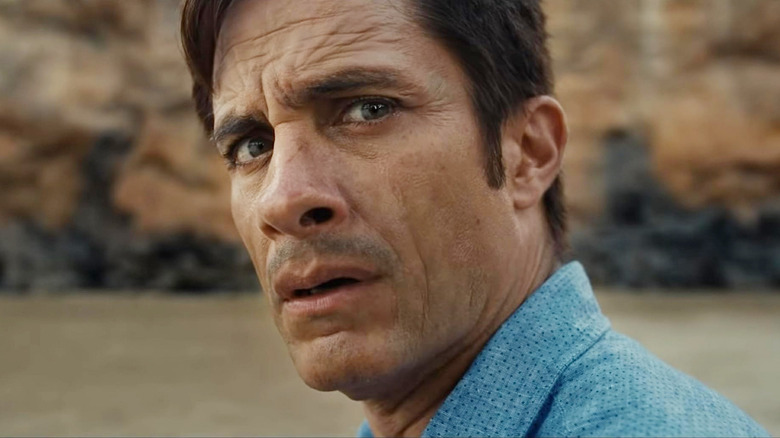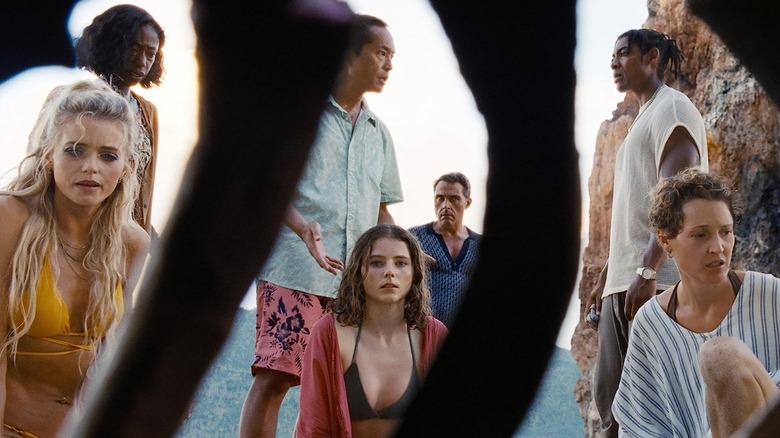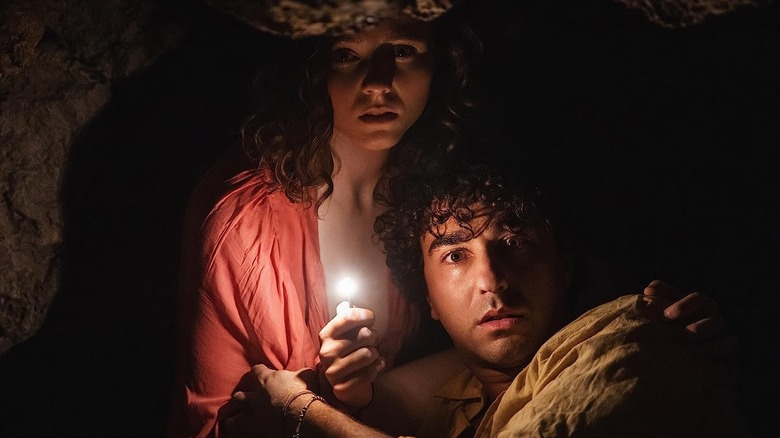Old Is M. Night Shyamalan's Weirdest Movie, And It Demands A Revisit On Streaming
Newsweek infamously proclaimed M. Night Shyamalan "The Next Spielberg" back in 2002, but it was already an unbecoming title for the then-budding storyteller. True, much like Spielberg, Shyamalan had made his name directing a hugely popular horror-thriller — in his case, "The Sixth Sense." Yet, Shyamalan immediately pivoted from his acclaimed, accessible ghost story to helming "Unbreakable," a broody, introspective deconstruction of comic book superheroes that released at a time when comic books were still a relatively niche industry. That should've been everyone's first clue that Shyamalan wasn't interested in being a Spielberg-like crowd-pleaser.
Since then, Shyamalan's films have only gotten weirder and more esoteric. Even his brief (and, by his own admittance, regrettable) branching out into big-budget directing culminated with 2013's "After Earth," a bizarre sci-fi father-son adventure that's way too fascinating and personal to dismiss as a hack job. However, out of all the films Shyamalan had directed since returning to his lower-mid-budget roots, none are quite as bewildering — yet oddly compelling and, at times, even poignant — as his 2021 horror-thriller "Old."
Adapted from Pierre Oscar Lévy and Frederik Peeters' French-language Swiss graphic novel "Sandcastle," Shyamalan's "Old" follows a small group of unsuspecting vacationers who find themselves trapped on a mysterious beach that causes them to age one year every 30 minutes. Despite its mixed reviews, the film was a commercial hit, taking home about $90 million at the box office against an $18 million budget. It's now gained a second wind and finds itself sitting pretty on Netflix's worldwide streaming charts, making this the perfect opportunity to discuss why this particular Shyamalan joint demands either a revisit or, if that's not the case, a first-time watch.
The beach that makes you old
"Old" has all the idiosyncrasies audiences have come to associate with M. Night Shyamalan the artist, from the deliberately-heightened dialogue that never quite sounds natural to the stylized visual compositions that don't always work yet never fail to grab your attention. There's also the somewhat gleefully sadistic edge that's found its way into Shyamalan's films since "After Earth," with characters often dying in over-the-top gruesome ways that seem designed to get viewers hooting and hollering just as much as — if not more than — crying out in horror. Even Shyamalan joins in on the fun with his trademark cameo, casting himself as a character who all but winks at the camera as he leads the film's protagonists to their doom.
Of course, there's stuff that flat-out doesn't work in "Old," like the film's insensitive and inaccurate portrayal of mental illness (a recurring problem in Shyamalan's work), or a big reveal during the third act that only seems to exist because, well, people expect Shyamalan's films to include twist endings. Then there are the quasi-conservative, almost puritanical overtones that tend to keep finding their way into Shyamalan's movies, although interpretations vary greatly on that subject (see also: the debates about what his most recent horror-thriller, "Knock at the Cabin," is even going for thematically).
Despite all that, the visuals in "Old" are as warped as its plot and will embed themselves in your brain long after watching the film. Moreover, the film's story itself is all about the dramatically different ways people confront their mortality, so in a sense it almost feels appropriate that Shyamalan, much like his characters as they scramble to escape the beach that makes you old, doesn't always appear to have a firm grip on the steering wheel.
'Were we fighting about something?'
Looking back on M. Night Shyamalan's career from the vantage point of the present, it's easy to develop a newfound appreciation for his movies. It would've been easier for Shyamalan to settle into a groove as a workman director after the critical beatings he took for his post-"Sixth Sense" offerings like "Lady in the Water" and "The Happening," but he didn't do that. Instead, he kept on doing his thing, overseeing tentpoles that allowed him to continue revisiting the spiritual themes and existential concerns from his earlier work. He then proceeded to literally reinvest in himself as he interrogated those same motifs through a series of modestly budgeted body horror flicks, capping off with "Old."
Reviewing "Old" for /Film, Chris Evangelista spotlighted the ways the film reflects Shyamalan's commitment to going against the ever-rising tide of an IP-dominated movie landscape and continuing to making the art he wants to make (off-putting and messy it can sometimes be). As Chris noted, "[...] It's a film with energy; a film with life. Shyamalan doesn't appear to have a firm grasp on this material, but again, he's trying! He's trying to give us something different. And these days, that's the sort of thing we should all be longing for." I find myself agreeing with him, even as my brain threatens to tear itself in half arguing back and forth over the positives and negatives of "Old" like it's the "American Chopper" argument meme.
At the end of the day, it boils down to this: I'll take interesting, problematic Shyamalan films like "Old" over the forgettable pablum Netflix spends hundreds of millions of dollars pumping out any day of the week. It's encouraging to know I'm not alone in that regard, judging by the film's current popularity on the streamer.


